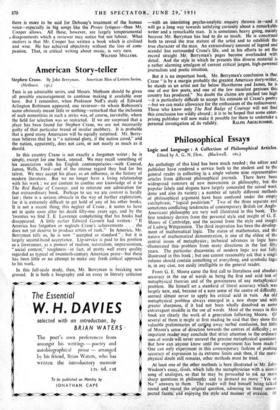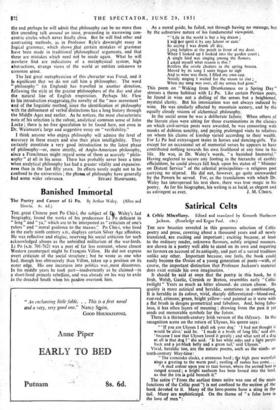Philosophical Essays
AN anthology of this kind has been much needed ; the editor and publisher have rendered a service both to the student and to the general reader in collecting in a single volume nine representative articles from different philosophical journals. There have been widespread rumours of new movements in philosophy, but the popular labels and slogans have largely concealed the actual work done and also its variety ; a number of totally different methods of philosophical argument have been confused under the empty catchphrase, "logical positivism." Two of the three separate and sometimes conflicting tendencies of contemporary British (or Anglo- American) philosophy are very well illustrated in this book. The first tendency derives from the personal style and insight of G. E Moore of Cambridge, and the second from the style and insight of Ludwig Wittgenstein. The third inspiration has been the develop- ment of mathematical logic. The status of mathematics, and the nature of mathematical demonstration, is one of the oldest of the central issues of metaphysics ; technical advances in logic have -illuminated this problem from many directions in the last fifty years. The particular discoveries of modern logic are not fully illustrated in this book ; but one cannot reasonably ask that a single volume should contain something of everything, and symbolic logic is, in any case, not easily intelligible to the general reader.
From G. E. Moore came the first call to literalness and absolute accuracy in the use of words as being the first and acid test of metaphysical theories and of the genuineness of any metaphysical problem. He himself set a standard of literal accuracy which was largely new, and, because of a sure sense of the centre of difficulty, seemed almost never to apply his critical acid in vain. An old metaphysical problem always emerged in a new shape and with greater sharpness, if it had not been wholly dissolved as some extravagant muddle in the use of words. Most of the essays in this book are clearly the work of a generation following Moore. Of several of them it might at first reading be said that they show the valuable preliminaries of cutling away verbal confusion, but little of Moore's sense of direction towards the centres of difficulty ; an impatient reader may conclude that strict attention to the ordinary uses of words will never unravel the genuine metaphysical questions. But how can anyone know until the experiment has been made ? One can only experiment in this contemporary fashion of pushing accuracy of expression to its extreme limits and.; then, if the meta- physical doubt still remains, other methods must be tried.
At least one of the other methods is here illustrated in Mr. John Wisdom's essay, Gods, which lulls the metaphysician with a siren's song of analogies, so that he may be persuaded to ask no more sharp questions in philosopby and to demand no more "Yes or No" answers to them. The reader will find himself being talked round and round the original question, admiring its many unsus- pected facets, and enjoying the style and manner of evasion. At
the end perhaps he will admit that philosophy can be no more than this unending talk around an issue, proceeding in narrowing con- centric circles which never finally close. But he will find other and contrasting methods, as in Professor Ryle's downright essay in logical grammar, which shows pat certain mistakes of grammar have been made in traditional philosophical arguments, and that these are mistakes which need not be made again. What he will nowhere find are indications of a metaphysical system, high abstractions, strange views of the world or entities unknown to common sense.
The last great metaphysician of this character was Freud, and it Is significant that we do not call him a philosopher. The word " philosophy " (in England) has travelled in another direction, following the style of the greater philosophers of the day and also the natural line of English empiricism. Perhaps Mr. Flew In his introduction exaggerates„the novelty of the "new movement" and of the linguistic method., since the identification of philosophy with the definement of verbal distinctions has a long history through the Middle Ages and earlier. As he notices, the most characteristic note of his selection is the robust, analytical common sense of John Locke ; there is no free speculation to be found here, not even in Dr. Waismann's large and suggestive essay on "verifiability."
I think anyone who enjoys philosophy will admire the level of accuracy in these essays and also their plain intelligibility. They certainly constitute a very good introduction to the latest phase 13.f philosophy—or, more strictly, of Anglo-American philosophy, since a Frenchman might regard some of them as scarcely " philo- sophy " at all in his sense. There has probably never been a time when analytical philosophy has had a greater vitality and expansive- ness than in the last fifty years. Its effects surely ought not to be confined to the universities ; the phases of philosophy have generally



































 Previous page
Previous page